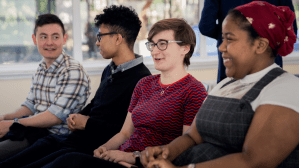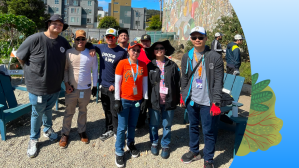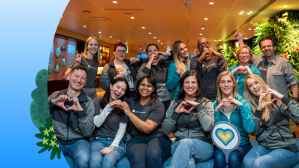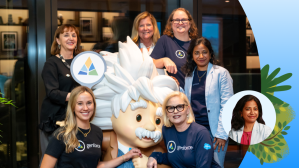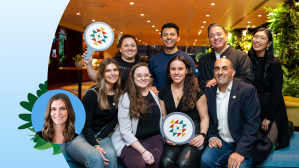At Salesforce, we believe that talent is equally distributed, but opportunity is not—and we are committed to closing that gap. That’s why a core focus of our workforce development strategy is preparing the next generation of leaders, especially young people from underserved and underrepresented communities, with the education, skills, and access to opportunities to succeed.
As the economy recovers from the pandemic and the future of work continues to evolve, we have both an opportunity and an obligation to create a more diverse and inclusive global workforce. We are leveraging our philanthropy, employee volunteer time, and meaningful partnerships to close the opportunity gap and ensure that all young people—regardless of their backgrounds—can succeed in today’s workforce.
Here are some of the common questions we’ve received about these programs.
Q: What is Salesforce’s strategy for closing the opportunity gap?
Together with our partners, we are working to ensure that young people from underserved and underrepresented communities can build skills and social capital, and access and succeed in meaningful careers. Our strategy is multifaceted:
- Untapped talent programs that bring young people from our workforce development partners into Salesforce through paid internships and apprenticeships;
- Philanthropic investments that support workforce development organizations focused on providing career exposure and access to skills and opportunities; and
- Employee volunteering to support young people with mentoring, professional development, and networking so they can build their skills and connections.
Q: What is untapped talent?
We define untapped talent as young people from underserved and underrepresented communities who may be unaware of or lack access to the career possibilities that exist for them. These individuals are full of potential, intelligence, and drive, but face a social capital gap, meaning they don’t have access to the networks or connections needed to access career opportunities in tech and other sectors. Helping untapped talent build their social capital is a foundational element of our workforce development strategy.
Our untapped talent programs
Q: What are Salesforce’s untapped talent programs?
Our internship and apprenticeship programs provide paid work experiences and on-the-job training for untapped talent. In partnership with workforce development training providers, these programs enable young people to establish a strong professional foundation, develop specialized skills, build their networks, and grow their careers. At the same time, they enable Salesforce to develop entry-level talent and bring fresh perspectives to our teams, adding tremendous value to our company.
Q: What do the internship programs look like?
Our untapped talent internship programs operate in the U.S., and we’re exploring expansion to additional markets. We manage these programs in partnership with workforce development organizations including:
- Year Up has a mission to close the opportunity divide by connecting talented and young people from diverse backgrounds with companies that need talent. After six months of intensive, full-time training, interns join Salesforce for a six-month paid internship. The goal is for them to remain at Salesforce or secure other training-related employment after their internship.
- Genesys Works has a mission to provide pathways to career success for high school students in underserved communities. Genesys Works interns spend 9-12 months at Salesforce while attending school half-time, gaining what is typically their first professional experience and exploring potential career paths before beginning college.
Q: What do the apprenticeship programs look like?
Our untapped talent apprenticeship programs currently run in the UK and Ireland, though we’re hoping to expand to additional markets in the coming years. Apprentices join Salesforce for 18-36 months, depending on the program. They “earn and learn” simultaneously, applying their learnings on the job, and the hope is that they remain at Salesforce after their apprenticeship. We manage these programs in partnership with various apprenticeship providers such as Ada: National College for Digital Skills and Multiverse in the UK, and FIT and MSLETB in Ireland.
Q: What has been the impact of the untapped talent programs at Salesforce?
Over the past 13 years, nearly 1,000 young people have joined Salesforce through our untapped talent programs, across all functions of the company. This includes nearly 650 Year Up interns in the U.S.; approximately 50% of these interns have stayed at Salesforce after their internship. There are countless success stories like those of Elena and Kristyne. In the UK, 75% of our apprentices have converted into full-time roles at Salesforce; apprentices like Chimezie are making an incredible impact on their teams.
Our philanthropic investments in workforce development
Q: What is Salesforce’s philanthropic approach to workforce development?
Through the Salesforce Foundation, we make grants to workforce development organizations that are opening the doors of opportunity and addressing system-level barriers faced by young people from underrepresented backgrounds. We invest in three areas:
- Early Career Exposure and Work-Based Learning: Supporting high school students to make informed choices about their career pathways by providing them with the opportunity to explore career tracks, gain (often paid) work experience, build their skills, and grow their networks.
- Diverse Pathways to Employment: Connecting young people to professional and technical skills, enabling them to access entry-level jobs that will advance into strong careers and develop professional networks that support long-term career success.
- Bridging Transitions Between Higher Education and Careers: Ensuring that higher education students from underserved and underrepresented communities have access to the professional experiences, skills, and networks needed to secure strong first jobs post-graduation.
Q: How much has Salesforce invested through this strategy?
Through the Salesforce Foundation, we’ve invested more than $27M to date in organizations focused on workforce development in the cities where we live and work.
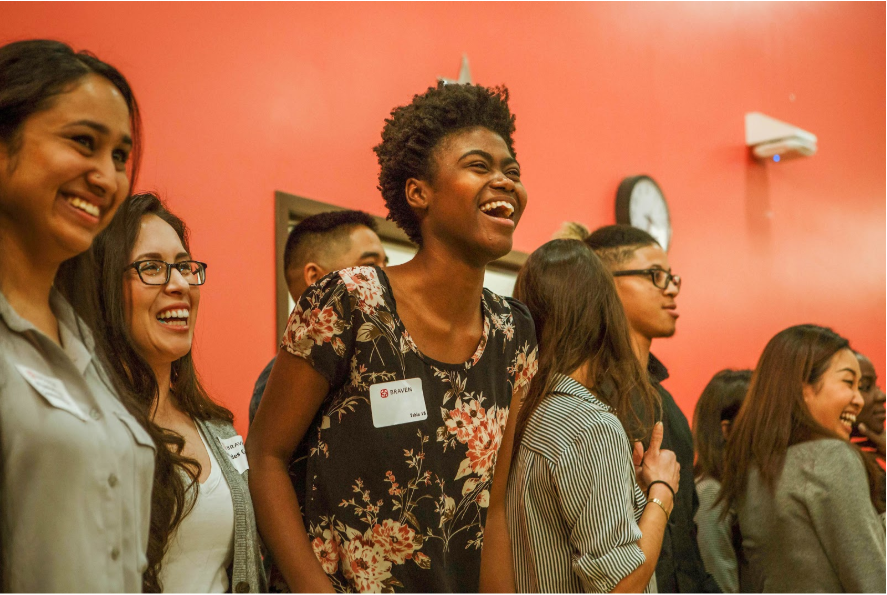
Q: What organizations does the Salesforce Foundation provide grants to?
A few of our grantees include:
- CareerTrackers (Australia) creates pathways for Indigenous young people to attend and graduate university and gain industry experience. Learn more about our partnership with CareerTrackers here.
- Per Scholas (U.S.) is opening doors to technology careers for individuals from overlooked communities. See this Q&A with Per Scholas President & CEO Plinio Ayala.
- Technological University Dublin (Ireland) connects university students from underserved and underrepresented communities to industry mentors to improve their transition into employment in the tech sector.
Our employee volunteering support for young people
Q: How do Salesforce employees support young people in building their careers?
Our employees participate in volunteer programs that are focused on helping young people build the experience, confidence, skills, and social capital that will ultimately contribute to a more accessible, equitable, and diverse workforce. Salesforce employees have volunteered more than 150K hours with workforce development organizations, and nearly 1,000 young adults globally have participated in these programs.
Q: What are examples of the volunteering programs?
In the U.S., we’ve hosted our Future Executive Summit at Dreamforce, bringing together young people to experience the conference while developing their professional networks by connecting with Salesforce employees, customers, and one another (see below video). Last year, our employees participated in Workforce Week, which offered career development workshops to 400 job seekers from underserved communities. Many of our employees also volunteer as mentors to our interns and apprentices.
In London, Salesforce employees support young people by mentoring through SEO London. In Ireland, our employees help migrant women on their journey to employment through our partnership with New Communities Partnership. And in Australia, our employees support CareerTrackers; this past year we helped transform their annual leadership conference for Indigenous students into a virtual event.
Q: What have you heard from young people about these experiences?
Young people who have connected with Salesforce volunteers have shared that these experiences helped them develop useful skills, learn about new areas of interest, and reimagine what’s possible for their futures. A high school teacher who brought young people to our Future Executive Summit said, “After the event, one of my students had a shift in thinking about his future and an increased confidence that he could pursue postsecondary education.”
And a participant of our Empowering Black Men of the Future program shared, “I learned that it doesn’t matter what someone else tells you. Always chase your dreams.” There are many other testimonies like these that speak to the impact these programs can have in supporting young people in their journeys to success.
For more information about Salesforce’s workforce development programs, visit here and here.
